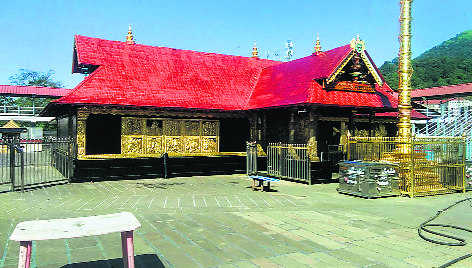
By a majority verdict of 3:2, a five-Judge Bench headed by Chief Justice of India Ranjan Gogoi framed seven issues (see box) for consideration of the seven-Judge Bench for enunciating constitutional principles to be followed in dealing with such issues in any religion.
Satya Prakash
Tribune News Service
New Delhi, November 14
Enlarging the scope of Sabarimala temple entry restrictions issue, the Supreme Court on Thursday referred to a seven-Judge Bench the issue of discriminatory practices in other religions as well for laying down constitutional principles for determination of such issues.
By a majority verdict of 3:2, a five-Judge Bench headed by Chief Justice of India Ranjan Gogoi framed seven issues (see box) for consideration of the seven-Judge Bench for enunciating constitutional principles to be followed in dealing with such issues in any religion. The other two Judges who were part of the majority verdict were Justice AM Khanwilkar and Justice Indu Malhotra.
The verdict came on petitions seeking review of its September 28, 2018, judgment allowing entry of women, irrespective of their age, into Lord Ayyappa’s hilltop temple at Sabarimala in Kerala. There were 65 petitions in all—56 review petitions, four fresh writ petitions and five transfer petitions.
While the majority referred the matter to a larger Bench, Justice Rohinton Nariman and Justice DY Chandrachud dismissed the review petitions, saying “organised acts of resistance to thwart the implementation of this judgment must be put down firmly”.
The verdict does not talk about stay on the original order allowing women, irrespective of their age, into the Sabarimala temple, which is to open for devotees from Sunday.
The majority verdict took note of the fact that the debate about constitutional validity of practices entailing into restriction of entry of women generally in places of worship was not limited to Sabarimala temple alone but also arose in respect of entry of Muslim women in a durgah/mosque and entry of Parsi women married to a non-Parsi into the holy fire place of an Agyari.
“It is time that this court should evolve a judicial policy befitting to its plenary powers to do substantial and complete justice and for an authoritative enunciation of the constitutional principles by a larger Bench of not less than seven judges.
“The decision of a larger Bench would put at rest recurring issues touching upon the rights flowing from Articles 25 and 26 of the Constitution. It is essential to adhere to judicial discipline and propriety when more than one petition is pending on the same, similar or overlapping issues in the same court for which all cases must proceed together,” said the majority verdict pronounced by CJI Gogoi.
Noting that there was a conflict between its judgments in Shirur Mutt case and Durgah Committee case, the majority verdict said it was required to be considered by the larger Bench, which may also decide if the Kerala Hindu Places of Public Worship (Authorisation of Entry) Rules, 1965, governed the temple in question at all.
“The endeavour of the petitioners is to resuscitate the debate about—what is essentially religious, essential to religion and integral part of the religion,” said CJI Gogoi, pronouncing the majority verdict. It left it to the seven-judge Bench to take a call on giving a fresh opportunity to all interested parties to be heard.
By 4:1 verdict, a five-judge Constitution Bench headed by the then CJI Dipak Misra had had on September 28, 2018, allowed entry of women, irrespective of their age, into the Sabarimala temple by declaring the age-old practice unconstitutional. Justice Malhotra, the lone woman on the Bench, had dissented.
The majority had declared unconstitutional Rule 3(b) of the Kerala Hindu Places of Public Worship (Authorisation of Entry) Rules, 1965, which barred entry of women between 10 and 50 years of age into the temple.
The verdict had led to massive protests by Lord Ayyappa’s devotees, particularly after the entry of two women into the temple. The devotees believed the age-old tradition of not allowing women in the age group of 10 to 50 years to enter the shrine should be respected as the deity was an eternal celibate.
2 judges dissent
The order was passed 3:2 as Justice Nariman and Justice Chandrachud dissented, sticking to their original stand declaring age restriction on entry of women unconstitutional



























